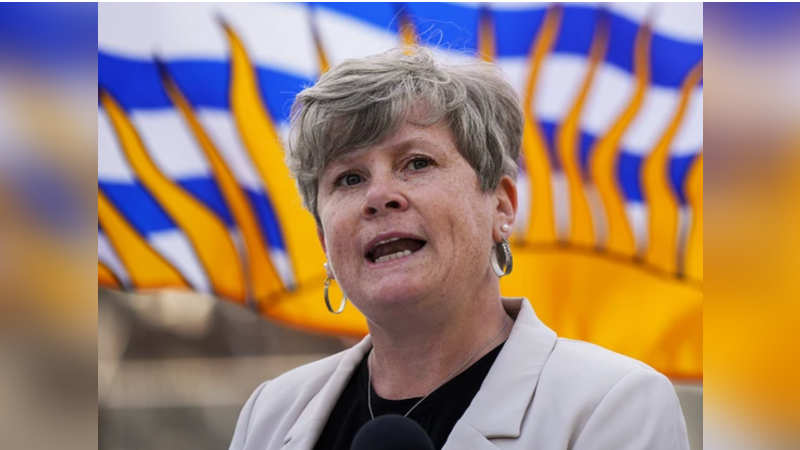The morning air carries a crisp bite as I stand outside the Thompson Rivers University Campus in Kamloops. Students rush past with coffee cups clutched in gloved hands, while a small crowd of healthcare workers, community advocates, and local politicians gather near the entrance of the Old Main building. They’re here for what could be a pivotal moment for mental health services in British Columbia’s Interior region.
Provincial Health Minister Adrian Dix is expected to arrive within the hour to announce what government sources describe as “significant funding” for mental health services. But for many Kamloops residents, the announcement comes with mixed emotions and lingering questions about the repeatedly delayed cancer care center that was promised to the region years ago.
“We need both, desperately,” says Marjorie Williston, a psychiatric nurse who’s worked in Kamloops for over two decades. “Mental health services have been stretched beyond breaking for years now, but cancer patients are still traveling hours to Kelowna or Vancouver for treatment. It shouldn’t be either-or.”
The anticipated funding announcement comes after a provincial review found that access to mental health services across B.C. remains deeply uneven, with Interior and Northern communities facing particularly severe shortages. According to data from the B.C. Centre for Disease Control, emergency department visits for mental health concerns have increased by nearly 40% in Kamloops since 2021, with wait times for non-emergency psychiatric care averaging 8-12 months.
Inside the university atrium, local Indigenous leaders from Tk’emlúps te Secwépemc (Kamloops Indian Band) perform a welcome ceremony. Elder Garry Gottfriedson speaks about the interconnected nature of physical and mental wellness, reminding the audience that “healing happens in community, when we address both the body and spirit together.”
This holistic perspective resonates with many healthcare providers, including Dr. Ravi Parmar, who splits his time between Royal Inland Hospital’s emergency department and a community clinic.
“What we’re seeing is a perfect storm,” he tells me during a break in the proceedings. “The lingering psychological impacts of the pandemic, increasing climate anxiety after years of wildfires, and a housing crisis that’s left many people in precarious living situations. When you combine all of that with existing service gaps, especially for complex care needs, you understand why today’s announcement matters.”
Health Minister Dix arrives just after 10:30, accompanied by the Minister of Mental Health and Addictions. After greeting local officials, he takes the podium and outlines what he calls a “transformative investment” in mental health services: $78.5 million over five years specifically targeted at Interior communities, with Kamloops receiving funding for a new integrated youth services hub, expanded crisis response teams, and additional psychiatric beds at Royal Inland Hospital.
The funding represents part of the province’s implementation of the renewed Mental Health and Substance Use Strategy that was released earlier this year. The strategy prioritizes trauma-informed care, culturally appropriate services for Indigenous communities, and better integration between emergency response and long-term support.
Yet as questions open to the media, the conversation quickly turns to the elephant in the room: the repeatedly delayed cancer center that Kamloops residents have been promised since 2020. When asked if today’s mental health funding means further delays for the cancer facility, Minister Dix appears visibly frustrated.
“These are separate funding streams, and both are priorities,” he insists. “The cancer center continues to move through the planning and budgeting process. Today’s announcement addresses an immediate and growing need for mental health services, particularly for young people in crisis.”
Local advocates aren’t entirely convinced. Outside the building, a small group of protesters holds signs reading “Cancer Patients Can’t Wait” and “Both Matter, Both Needed Now.” Among them is Sheila Blackstock, who lost her mother to breast cancer last year.
“Mom spent her final months traveling back and forth to Kelowna for treatment. Three hours each way, sometimes in snowstorms,” she tells me, eyes welling. “That’s time she could have spent with her grandkids. When I hear about more delays, I think about all the families going through what we did.”
This tension between competing healthcare priorities reflects broader challenges facing B.C.’s healthcare system. According to the Canadian Institute for Health Information, the province has seen some of the longest surgical wait times in the country, while simultaneously facing critical staffing shortages across multiple specialties.
For Thompson Rivers University nursing student Jamie Chen, today’s announcement offers a glimmer of hope. “I’m specializing in psychiatric nursing because I see the need everywhere,” she says. “But my concern is whether this funding will translate into enough actual staff to deliver these services. You can build facilities, but if we can’t recruit and retain healthcare workers, especially in smaller communities, we’ll still have gaps.”
Chen’s concern is echoed by the BC Nurses’ Union, which released a statement following the announcement calling for “concrete workforce planning” to accompany the new funding. The union cited a recent survey indicating that nearly 35% of nurses working in mental health settings were considering leaving the profession due to burnout and workplace safety concerns.
As the formal announcement wraps up, I speak with Kamloops Mayor Reid Hamer-Jackson, who describes feeling “cautiously optimistic” about the mental health funding while remaining frustrated about the cancer center timeline.
“Our community deserves both,” he says. “Mental health services are desperately needed, especially after everything our region has endured with wildfires, floods, and the pandemic. But cancer patients shouldn’t have to choose between treatment and being close to their support networks.”
As attendees file out into the strengthening midday sun, the mood seems to reflect this complicated mix of gratitude and persistent concern. For a region that has faced more than its share of challenges in recent years, today’s announcement represents progress, but not completion, of the journey toward comprehensive healthcare.
Whether the new mental health funding will translate into meaningful improvements—and whether the long-awaited cancer center will finally move from promise to reality—remains to be seen. What’s clear is that for communities like Kamloops, located far from the province’s power centers, the fight for equitable healthcare continues, one announcement at a time.






